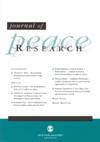Americans are a major target of international terrorism. Yet, terrorists from some countries are much more likely to attack American citizens than terrorists from other countries. Similarly, anti-American terrorism from a specific foreign country is much more prevalent during certain periods than others. This article develops a rational theory of international terrorism, which argues that attacking foreign nationals is of strategic value to terrorists even if they ultimately aim at gaining political influence in their home country. Attacking foreigners is the more attractive to domestic terrorists the more the terrorists’ home government depends on military support from the foreign country. Applied to the US case, our theory predicts that more anti-American terrorism emanates from countries that receive more US military aid and arms transfers and in which more American military personnel are stationed, all relative to the country’s own military capacity. Estimations from a directed country dyad sample over the period 1978 to 2005 support the predictions of our theory for both terrorist incidents involving Americans and terrorist killings of Americans as dependent variables. These results are robust to a wide range of changes to the empirical research design.
Neumayer, Eric & Thomas Plümper (2011) Foreign Terror on Americans, Journal of Peace Research 48 (1): 3–17.






